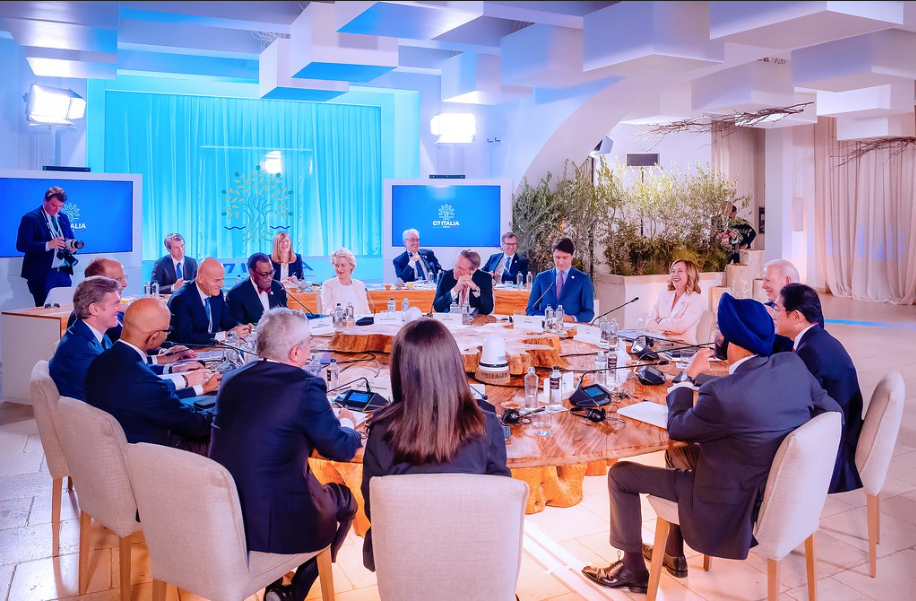General
G7 Leaders Pledges $420m Investment to Tackle Africa’s Infrastructure Deficit
Published
2 years agoon

Leaders of the G7, an informal association of seven of the world’s advanced economies and some of Nigeria’s biggest trading partners, have pledged a $420 million investment commitment to boost infrastructure in Africa.
The G7 countries include: Canada, France, Germany, Italy, Japan, the United Kingdom, and the United States, as well as the European Union (EU).
Read Also:
Rising from its 50th summit in Italy, tagged: “G7 Partnership for Global Infrastructure and Investment”, they welcomed the commitments of $100 million and $320 million by partners, aimed at meeting the infrastructure and development needs of Africa through private sector engagement.
The leaders agreed to support flagship projects to develop transformative economic corridors for quality infrastructure and investments, touching Africa, the Middle East and Europe.
“Today, Italy joined US and EU efforts to promote sustainable development along the Lobito Corridor – committing to strengthen collaboration and mobilise an additional aggregate contribution of up to $320 million in investment in support of the core rail infrastructure and of the related side projects, with a view to additionally creating synergies with the Alliance for Green Infrastructure in Africa (AGIA).
“The Co-chairs welcomed the Africa Green Industrialisation Initiative (AGII) as a key platform for collaboration on infrastructure investment in Africa and celebrated the Global Energy Alliance for People and Planet (GEAPP) commitment of up to $100 million in philanthropic catalytic investment capital to unlock an additional $1 billion in private finance,” the group said.
The AGIA, led by the African Development Bank (AfDB), African Union Commission (AUC), is a platform that seeks to generate, finance, and execute projects with the private sector, and to catalyse up to $10 billion green infrastructure opportunities for private sector investment.
On the paucity of energy in Africa, it said: “We recognise that universal access to affordable clean energy is a key factor for sustainable, resilient and inclusive economic growth and social development, as proclaimed by the 2030 Agenda for Sustainable Development and the African Union’s Agenda 2063. It also contributes to meeting the climate goals of the Paris Agreement and to keeping a temperature limit of 1.5C within reach.
“Africa’s significant but largely untapped clean energy potential needs massive investments. We will work to accelerate investments in clean energy sources to ensure an inclusive transition which supports energy security, recognizing that a substantial proportion of people in Africa still lack reliable access to electricity and clean cooking
“We look forward to the launch of the G7’s ‘Energy for Growth in Africa’ initiative and to contributing to its success. The initiative will help develop bankable clean energy projects, attract private capital through the catalytic use of public finance and technical assistance, encourage the flow of concessional finance, and overcome barriers to investments in clean energy across Africa,” the group added.
The group of rich countries said it will engage with governments, the private sector, financial institutions, multilateral development banks, and community groups and also coordinate with existing programmes, to ensure complementarity and avoid duplications.
Meanwhile, AfDB’s President, Adewumi Adesina, told Reuters in London that something African countries needed to stamp out was resource-backed loans – where they promise to supply oil, gas or metals in return for the money, often on undisclosed terms.
“It is an approach some have used to secure funding from China as well as other countries, banks and commodity firms.
“If somebody has a liquidity challenge, it doesn’t mean you should pawn your assets,” Adesina said, while also criticising the providers of such loans.
“It’s like scavenging! Financial scavenging to take advantage of desperation of countries,” he said.
“It’s not about any particular country or institution, it is a fundamental thing. I think it is a disaster for Africa,” he added.
Besides, he noted that there was the need for the world to take cognisance of the economic and planetary value of Africa’s savannahs, rainforests, rivers and oceans.
He estimated them be worth at least $6.8 trillion and the bank wants to recalculate the continent’s Gross Domestic Product (GDP) figures to incorporate it all. The Congo Basin for example is estimated to be the world’s largest carbon sink, bigger than the Amazon.
Share this:
- Click to share on X (Opens in new window) X
- Click to share on Facebook (Opens in new window) Facebook
- Click to share on WhatsApp (Opens in new window) WhatsApp
- Click to share on Pocket (Opens in new window) Pocket
- Click to share on Telegram (Opens in new window) Telegram
- Click to email a link to a friend (Opens in new window) Email
- Click to share on LinkedIn (Opens in new window) LinkedIn
You may like


AfDB Approves $3.9m for Nigeria, others to Connect 300m Africans to Electricity


AfDB, Invest in Africa Sign $850,000 Deal to Create Green Jobs in Ghana and Senegal


Africa Looks Inwards for Financial Sovereignty amid Falling FDI and Grants


Nigeria Launches $510m SAPZ Agricultural Revolution Backed by AfDB


AfDB Basks in Global Recognitions for Transforming Africa with $318bn Capital Base


AfDB, US Sign $700,000 Credit Rating Deal to Boost Africa’s Capital Flow












